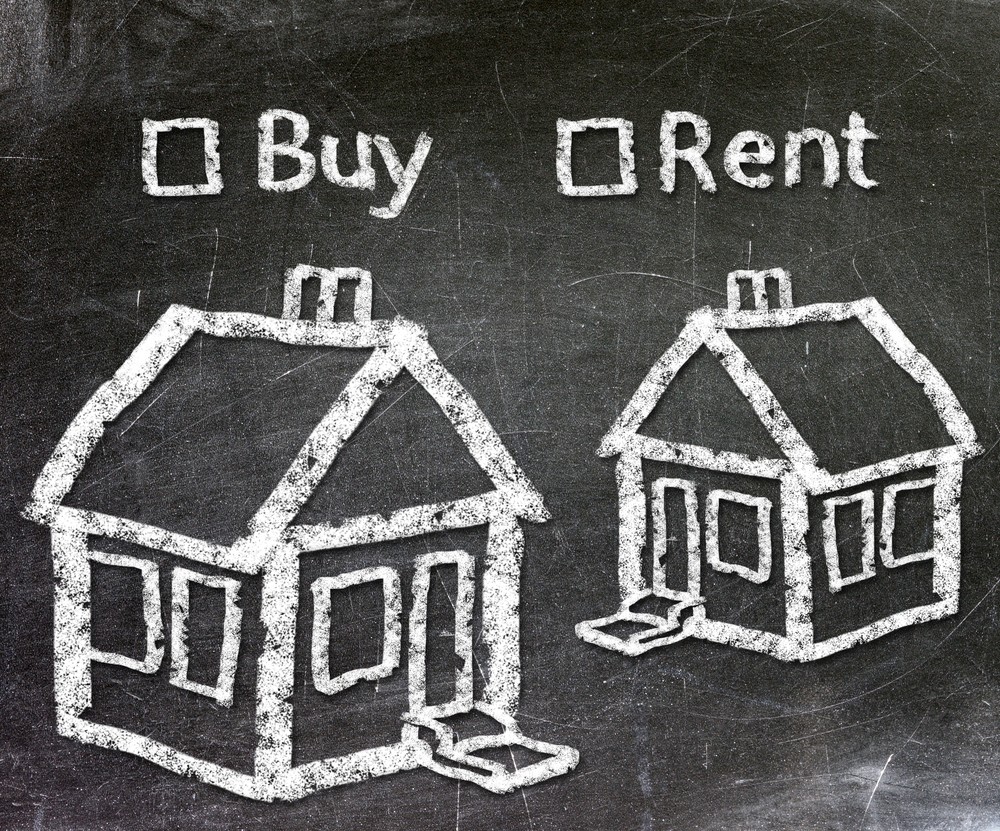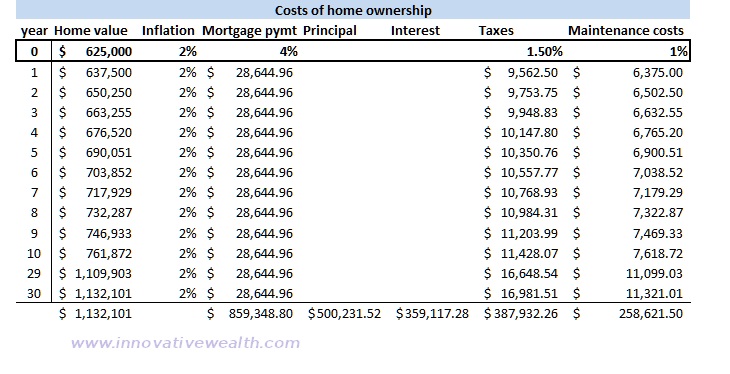In the prior post of this series, Should You Rent or Buy a Home?, I wrote about the pros and cons of home ownership vs renting. It is important to start here when you are considering whether to rent or buy a home. The decision of where to live should not be solely made on emotional attachment or financial considerations. It should be made up of both if you are planning on living in a home for many years. You want to love where you live.
This week’s post will be focused more on the financial considerations of renting vs buying a home. More specifically, what is the true cost of owning a home? If you have never correctly run these numbers before, the data may surprise you.
This week I will give you an example of what the true costs of owning a home are. In next week’s post, What You Don’t Know About Renting vs. Buying a Home Can Cost You Money, I will compare some real life examples of costs of renting vs buying a home.
I hope I am able to forever change how you look at buying the home you want to live in.
The True Cost of Owning a Home
If you are making the comparison of renting vs buying a home, you need to consider all the factors. If you do a quick search online, most of the resources available will only look at mortgage payments, taxes, insurance, and maybe HOA fees. However, many of them will not discuss and outline the “other costs”. These are costs such as landscaping, snow removal, home furnishings, repairs, maintenance, replacements, and renovations. These “other costs” can add up to a lot over time.
When you calculated the costs of purchasing your home, did you calculate out the costs of putting on a new roof, a new HVAC system, new water heater, new siding for your home, costs for landscaping your property, new appliances, etc?
If you did, then congratulations, you did it right. Most people don’t include these things. Granted some of these maintenance and replacement items are not predictable, but most of them have predictable life spans.
An Example of the True Costs of Owning a Home
Let’s say you are looking to buy a single family house. You are driving down the street and see the perfect one, and it has just been listed on the market. The listing price is $625,000. Both you and your spouse agree that it is perfect and you decide to put in an offer for $625,000. What will it cost you to own this home?
Let’s start with the basic assumptions:
- You are planning on living in this home for 30 years
- The purchase price is $625,000
- Your down payment is $125,000 (assuming you are putting down 20%)
- Your mortgage will be for $500,000
- The interest rate of a 30 year fixed mortgage is 4%
- Your mortgage payment will be $28,644.96 annually
- The rate of inflation is 2%
- Your annual maintenance costs are 1% (starting at $6,375)
- Your real estate taxes are 1.5% (starting at $9,562.50) (this will vary on your location)
Here is a chart of what your costs would be over 30 years.
Summary of the True Cost of Owning a Home:
I will point out some interesting data from this example in case you missed it:
- You purchased a home for $625,000 and put down $125,000 as a down payment. In 30 years your home would have appreciated at the rate of inflation to a value of $1,132,101. This is a gain of $507,101. – This looks good so far.
- The total amount of taxes that you paid amounts to $387,932. – Wow! that is a lot of taxes.
- The total amount of maintenance costs it would take in upkeep of your home would amount to $258,622. – All those trips to home depot really add up.
- The total interest paid on the mortgage amounts to $359,117. We don’t include the total mortgage payment because it includes principal payments which are effectively paying yourself.
- We don’t include factors like insurance, utilities, etc because they would be roughly the same for both renters and owners.
- The total costs to own a home for 30 years add up to $1,005,671. – Ouch… really that much?
- If you subtract the total value of the home from the costs of owning it, you get $126,430. – Huh?!? Isn’t that the amount you used as a down payment?
Over a period of 30 years, assuming you do no renovations and don’t have a HOA fee, living in a home you bought would net you $1,430. Yes, you read that correctly… $1,430 in gains over 30 years on your $125,000. Wow.
Actually, if you discount the value of your $1,430 due to inflation, your $1,430 in 30 years from now would only be worth $789.50 in today’s dollars.
Now let me answer the question:
Is your home a good investment??? NO.
Let’s take this example one step further…
What is Your Cost of Capital?
It is clear that over the past 30 years, your $125,000 down payment didn’t grow much more than the cost of a new iPad. It is clearly a bad investment. The next question to ask yourself is, if you didn’t put down 20% to buy a house, what could you do with the money?
There were a lot of options 30 years ago. CDs, treasuries, stocks, etc. were all better opportunities in hindsight, but since none of us live in the past, let’s look at today.
- Treasury Bonds – If you put your $125,000 into a 30 year Treasury bond, you would get 2.9% in annual interest. Holding it for 30 years would net you $178,240 in interest payments.
- Stocks – If you invested it in stocks, and the past performance is indicative of future results* (which it isn’t), the past 30 years performance of the S&P 500 was approximately 8.4%. This would turn your $125,000 into $1,405,363. A sizable difference in your net worth.
- Rental Real Estate – If you invested it into rental property, the value of the property would approximate the rate of inflation, but each year you should receive income that would increase. Even if you only had a 5% yield with no rent increases for 30 years, you would gain $442,254.94 in rental income.
* Please note that none of these performance numbers are an indication of what the future holds. Past performance is not indicative of future results.
Clearly almost any investment over 30 years would produce a better return than owning a home that you lived in. My local bank is giving 0.10% interest on savings accounts. Even that produces a higher return on my money after 30 years.
If owning your home is a bad investment, what should you do?
This example was calculated proportionally, so that it would represent a typical home purchase and that the expenses would scale with a change in price. Certainly, taxes might be higher or lower in your area, maintenance costs are lower for newer homes and higher for older ones, and there are plenty more what ifs. No matter what price you use for your home, the proportions should remain the same… at least until mortgage rates go up, as they are starting to do now.
The next post, What You Don’t Know About Renting vs. Buying a Home Can Cost You Money, analyzes the costs of owning vs cost of renting. This one will be much more interesting since it is dynamic and very dependent on the area you live in and the price of the home. I will provide a few examples from the Greater Boston area. Make sure you do the same in your location.
Now that we have dispelled with the notion that buying a home is a good investment. I think it should make the rest of the conversation about buying a home much easier.
One last thing about mortgage rates…
* There is one large variable in this whole analysis which needs additional mention… Mortgage rates. Mortgage rates are at historic lows. Lows that may never be seen again.
In the above example, I used mortgage rates at 4%. This is approximately where they are now. However, a change in rates will produce a huge impact on the above calculations.
In the above example, the total interest payments come out to $359,117 over 30 years with a 4% 30-year fixed mortgage. What would happen if the rates went up only 2%? What would happen if the interest rate went back to its historical average of 8.41%?1
If mortgage rates went up to 6% the total interest paid would amount to $579,191. An additional $220,074 in interest payments.
If mortgage rates went back to the historical average of 8.41% the total interest paid would amount to $872,580. An additional $513,463 in interest payments. That is 2.43 times the amount of interest paid over 30 years between the 4% rate and the 8.41% rate.
Just for reference, if the mortgage rates went up to 5.17% then this would cause you to lose your entire down payment ($125,000) over the next 30 years to interest payments.
Next Week…
Come back next week for more analysis on renting vs buying a home. If you like what you read and want an easier way to receive it, sign up for our private email service. Each week our blog posts, articles, and content upgrades will be sent directly to your inbox so you don’t miss any valuable information.
Sources:
1. Federal Reserve Bank of St. Louis
About Innovative Advisory Group: Innovative Advisory Group, LLC (IAG), an independent Registered Investment Advisory Firm, is bringing innovation to the wealth management industry by combining both traditional and alternative investments. IAG is unique in that they have an extensive understanding of the regulatory and financial considerations involved with self-directed IRAs and other retirement accounts. IAG advises clients on traditional investments, such as stocks, bonds, and mutual funds, as well as advising clients on alternative investments. IAG has a value-oriented approach to investing, which integrates specialized investment experience with extensive resources.
For more information, you can visit http://innovativewealth.com
About the author: Kirk Chisholm is a Wealth Manager and Principal at Innovative Advisory Group. His roles at IAG are co-chair of the Investment Committee and Head of the Traditional Investment Risk Management Group. His background and areas of focus are portfolio management and investment analysis in both the traditional and alternative investment markets. He received a BA degree in Economics from Trinity College in Hartford, CT.



